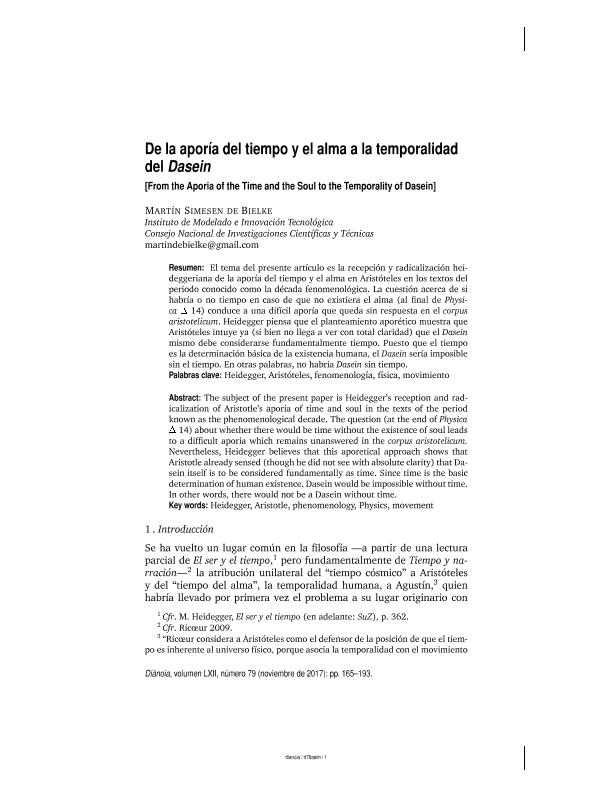Mostrar el registro sencillo del ítem
dc.contributor.author
Simesen de Bielke, Martín Miguel

dc.date.available
2019-04-16T19:32:28Z
dc.date.issued
2017-11
dc.identifier.citation
Simesen de Bielke, Martín Miguel; De la aporía de tiempo y alma a la temporalidad del Dasein; Universidad Autónoma de México; Dianoia; 62; 79; 11-2017; 165-192
dc.identifier.issn
1870-4913
dc.identifier.uri
http://hdl.handle.net/11336/74512
dc.description.abstract
El tema del presente artículo es la recepción y radicalización heideggeriana de la aporía del tiempo y el alma en Aristóteles en los textos del periodo conocido como la década fenomenológica. La cuestión acerca de si habría o no tiempo en caso de que no existiera el alma (al final de Physica 4, 14) conduce a una difícil aporía que queda sin respuesta en el corpus aristotelicum. Heidegger piensa que el planteamiento aporético muestra que Aristóteles intuye ya (si bien no llega a ver con total claridad) que el Dasein mismo debe considerarse fundamentalmente tiempo. Puesto que el tiempo es la determinación básica de la existencia humana, el Dasein sería imposible sin el tiempo. En otras palabras, no habría Dasein sin tiempo.
dc.description.abstract
The subject of the present paper is Heidegger’s reception and radicalization of Aristotle’s aporia of time and soul in the texts of the period known as the phenomenological decade. The question (at the end of Physica ∆ 14) about whether there would be time without the existence of soul leads to a difficult aporia which remains unanswered in the corpus aristotelicum. Nevertheless, Heidegger believes that this aporetical approach shows that Aristotle already sensed (though he did not see with absolute clarity) that Dasein itself is to be considered fundamentally as time. Since time is the basic determination of human existence, Dasein would be impossible without time. In other words, there would not be a Dasein without time.
dc.format
application/pdf
dc.language.iso
spa
dc.publisher
Universidad Autónoma de México
dc.rights
info:eu-repo/semantics/openAccess
dc.rights.uri
https://creativecommons.org/licenses/by-nc-sa/2.5/ar/
dc.subject
Heidegger
dc.subject
Aristóteles
dc.subject
Fenomenología
dc.subject
Física
dc.subject.classification
Estudios Religiosos

dc.subject.classification
Filosofía, Ética y Religión

dc.subject.classification
HUMANIDADES

dc.title
De la aporía de tiempo y alma a la temporalidad del Dasein
dc.title
From the Aporia of the Time and the Soul to the Temporality of Dasein
dc.type
info:eu-repo/semantics/article
dc.type
info:ar-repo/semantics/artículo
dc.type
info:eu-repo/semantics/publishedVersion
dc.date.updated
2019-04-16T13:15:16Z
dc.journal.volume
62
dc.journal.number
79
dc.journal.pagination
165-192
dc.journal.pais
México

dc.journal.ciudad
DF
dc.description.fil
Fil: Simesen de Bielke, Martín Miguel. Consejo Nacional de Investigaciones Científicas y Técnicas; Argentina. Academia Nacional de Ciencias de Buenos Aires. Centro de Estudios Filosóficos "Eugenio Pucciarelli"; Argentina
dc.journal.title
Dianoia
dc.relation.alternativeid
info:eu-repo/semantics/altIdentifier/url/http://www.filosoficas.unam.mx/~ojsdianoia/index.php/dianoia/article/view/1512
dc.relation.alternativeid
info:eu-repo/semantics/altIdentifier/url/http://www.scielo.org.mx/scielo.php?script=sci_arttext&pid=S0185-24502017000200165
Archivos asociados
